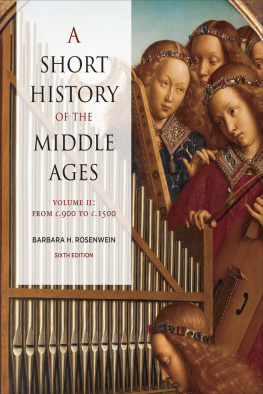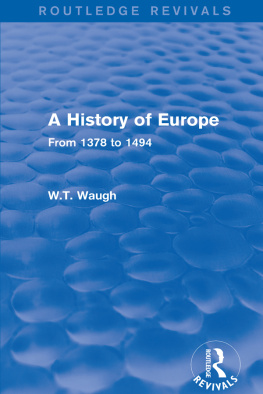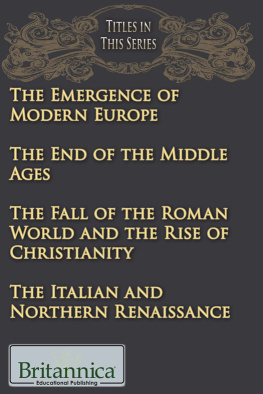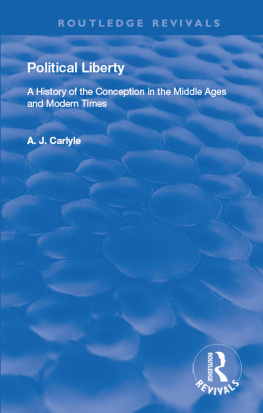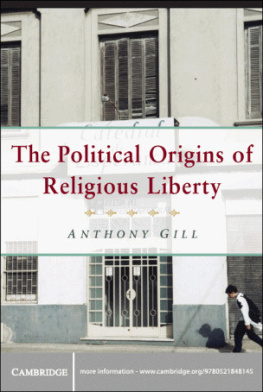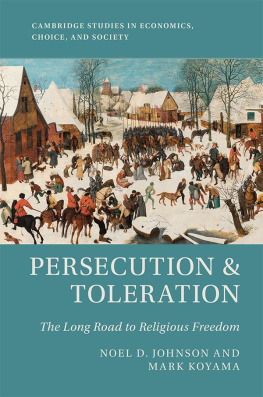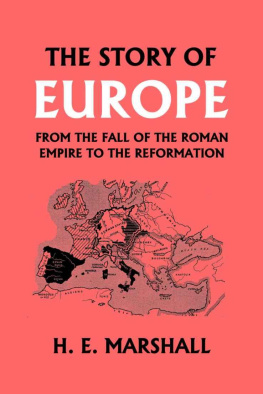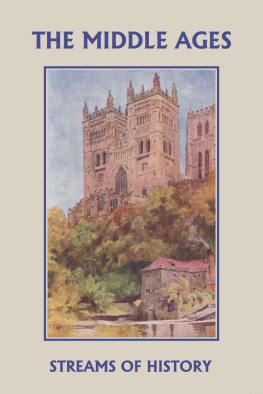THE PRINCIPLE OF THE MEDIVAL, feudal state is to be found in the division of what we call sovereign powers among a great number of persons. These powers are chiefly the military, the judicial, and the financial. The military power includes not merely the defence of the country against a foreign enemy, but also the maintenance of order within the country or, in our modern usage, police. The judicial power means the right and the corresponding duty to administer justice in all civil cases, that is, cases involving questions of right as between one man and another, and also to punish offences against the welfare of society, or, to speak technically, crimes. The possession of judicial power implies also the existence of a sufficient military force to carry out the decisions of the court, whether this force be in the hands of the court itself or of some power on which it can depend to work in harmony with it.
The financial power means the right to tax the people for public purposes, and the variety of ways in which this can be done is infinite. In practice, of course, this power also cannot be applied without a sufficient working force to carry it into effect. It is by far the most difficult to regulate of the three attributes of sovereignty because it is never quite easy to define just what are public purposes or how far the financial superior may go in his demands. Under the feudal system of the Middle Ages these rights were generally combined in one hand. The same person was military leader, judge, and tax gatherer, and there was a vast number of such persons, separated one from the other by divisions of territory or by the gradations of rank. It is true that these scattered territories were held together in larger groups, the great principalities or kingdoms, and that the different ranks within such a larger territorial unit were bound to each other by a chain of allegiance to the prince or king at the head. In theory the king had the supreme military, judicial, and financial control of the kingdom. He appears as the head of the national army, he is the fountain of justice for all the people, and he has a right to demand from the people a contribution of their wealth to carry on the business of government. Or, to begin at the other end, in theory the people paid taxes to support persons who should see that justice was done them and who should defend them against their enemies or lead them out to war for their advantage. All this in theory; in practice the society of the Middle Ages felt but slightly the bonds of this larger association in what we call the State. It felt very strongly the bonds which held individuals together in the smaller territorial groups or in the grades of social rank. It was a matter of comparative indifference to the medival man whether he were called a Frenchman, a German, or an Englishman. He might as well pay his taxes or serve in the army or get his justice under one of these names as the other; but it was a matter of great moment to him whether he were a Gascon, a Norman, a Picard, a Burgundian, a Swabian, or a Saxon. So, again, he was keenly conscious whether he was a freeman or a serf, a villain or a knight, a crown vassal or a vassal of the Church, and he felt a certain community of interest with all his brethren in rank, no matter under what ultimate sovereignty they might be living.
The story of Roger Bigod, Earl of Norfolk and Marshal of England, told in the quaint language of Walter of Hemingburgh, shows the temper of feudal independence. Called by King Edward I to serve in Gascony while the king was fighting in Flanders, he refused.
At the feast of St. Matthew the Apostle, in the year 1297 the king summoned the lay chiefs of the realm to a parliament at Salisbury and called upon certain of the barons to go to Gascony; but they began, one by one, to excuse themselves. Then the king was wroth and threatened some of them that if they refused to go he would give their lands to others who would go. At this many were scandalized, and a division began among them. For the Earl of Hereford and the Earl Marshal made their excuse, saying that they would gladly pay the service to which they were bound by hereditary obligation and would go with the kings person. And a second time the demand was made of the Earl Marshal that he should go. Then he said: Freely will I go with you, O King! as my hereditary duty requires. And the king said: Without me too you shall go with the rest. He replied: To this I am not bound, and it is not my will to take the field without you.
Then the king in his wrath broke forth, it is said, in these words: By God, Sir Earl, you shall either go or hang! And he: By the same oath, Sir King, I will neither go nor hang!
When the emperor Frederic Barbarossa was gathering his forces for his great struggle with the cities of Lombardy, he ordered, begged, entreated, even went on his knees to his subject, Henry the Lion, duke of Bavaria and Saxony, to persuade him to join his army, but Henry refused, and there was no process by which either he or his fighting men could be compelled to obedience. The crushing defeat of Barbarossa in the fatal day of Legnano (1176) was largely owing to this refusal.
It is evident that under such a system of government great national undertakings were impossible, and in fact the chief military achievements of the Middle Ages were either feats of arms under single princes, like the conquest of England by William of Normandy and that of Southern Italy by other Normans, or else they were great schemes having a universal character, such as the Crusades in the East and the overrunning of Languedoc in the early thirteenth century in the name of orthodox Christianity. The system could survive only so long as the sentiment of nationality remained weak. As soon as national limits became fairly well determined and men were beginning to feel themselves as belonging primarily within these territories rather than primarily as members of a race, then the instinct to express this territorial allegiance by service began to assert itself. That is what we mean by Nationality, and it is a sign of the coming of the modern world in distinction from the world of the Middle Ages. It takes a long time for this sentiment to become practical and to work itself out into institutions, but the thing itself is unmistakable from the first, and the growth of the institutions that embody it can be traced with entire distinctness.
Let us go back to one of our illustrations. After the return of Frederic Barbarossa from his defeat in Italy, he proceeded to punish Henry the Lion for his disobedience. He first called an assembly of the German princes, many of whom he had bought by great concessions of land and power, and gained from them as a court of peers a judgment against Henry for violating his feudal obligation. Then acting upon this as his authority he declared Henry to have forfeited his feudal estates. Finally, with the help of other princes who expected to share the spoil, he drove him from his dukedoms and divided these among his own fideles. That was the medival method. Henry was a traitor, not to Germany but to his feudal superior. He had violated the contract by which he held his principalities, and the penalty was the loss of these and their redistribution to more faithful vassals. But the price of victory for the crown was one that it could not often afford to pay. There could not be an unlimited supply of crown fiefs with which to buy the support of one vassal against another, and a crown dependent upon this kind of support would not be worth the having. The system worked only so long as there was not much for kings to do, and while society was constituted on this basis, it produced some very splendid results. The moment, however, that governments, royal or not, began to be conscious of their rights and duties, the weakness of it became unendurable.


